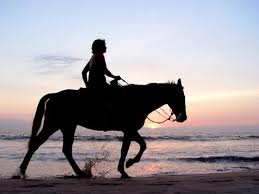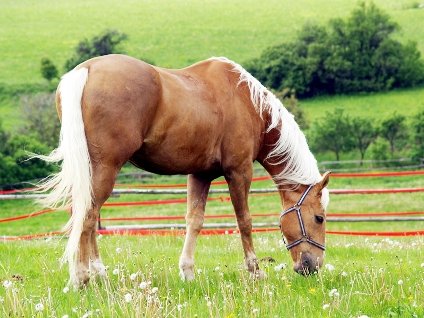 In my quest to provide good advice to my readers, one of my most often incurred questions is how to overcome your fear of riding. While there are millions of people who love horses, a surprisingly large percentage of those people are actually afraid of them. Some are afraid because of a frightening experience in their past, and others have an instinctive fear stemming from an overall lack of experience with horses. Either way, the fear of horses (which has its own scientific term equinophobia or hippophobia), can be helped and sometimes completely overcome.
In my quest to provide good advice to my readers, one of my most often incurred questions is how to overcome your fear of riding. While there are millions of people who love horses, a surprisingly large percentage of those people are actually afraid of them. Some are afraid because of a frightening experience in their past, and others have an instinctive fear stemming from an overall lack of experience with horses. Either way, the fear of horses (which has its own scientific term equinophobia or hippophobia), can be helped and sometimes completely overcome.
The first thing I would like to point out is that it is far easier to prevent the birth of fear than it is to remedy it. Let’s look at two examples to illustrate this fact. My sister Kellie was born into a ranching family, was set up on the back of a horse before the age of one, and was riding on her own at age four. She was stepped on, backed into, bucked off, and shied with multiple times by various horses, but she never experienced any real pain and she never had an ounce of fear in her. On the other hand, we invited a friend of ours named Hannah to come out and ride one Sunday afternoon. She was about thirteen years old, had ridden maybe once before, and on the way back towards the barn the horse bucked with her and she fell off and went to the emergency room with a broken arm. I am pretty certain Hannah has not ridden a horse since.
Now, certainly a lot of chance goes into the equation, but there are a few things that can help prevent the fear of horses.
1. Equip yourself with a basic knowledge of horses. If you have not been around horses much, there are some key elements you need to know. Horses are flight animals, which means their strongest instinct in danger is to run. While they do use defensive strategies within the herd, such as kicking or biting, they almost always defend themselves by moving away from what scares them, and it is usually lightning quick. Because they are such large animals, this makes them more dangerous to be around. There is a huge difference between getting stepped on by your dog and getting stepped on by a horse! When you have been around horses for awhile, you begin to pick up on their tendencies. You can watch their behaviors and body language, and predict what will happen next in most all of their situations. Just being around horses and learning about their natural instincts will help you know what actions they will take, and you’ll be able to protect yourself and move out of harm’s way.
2. Match your disabilities with the horse’s abilities. Whatever weaknesses you have as a rider, make sure the horse’s strengths make up for them. For instance, if you have little riding experience, make sure that the horse you are going to ride has a LOT of riding experience and is a qualified horse for a beginner. So many people get on horses that are above their level of expertise, and the ride is anything but pleasant, often resulting in injuries or a fear of riding. So make it your responsibility to only get on a horse that is going to behave well for you. This is probably the biggest mistake people make with horses—just don’t get on the horse unless you are sure it is trained well enough for you. Taking a chance on a greenbroke horse is not worth a trip to the emergency room, or the lifelong fear of horses that you may acquire if you get in a fracas.
3. Follow the rules of common sense and horse etiquette. One big rule my mom taught us when we were kids will stick with me the rest of my life: Don’t let your horse run towards home. Something about the faster speed and a group of horses running together always seems to make them more likely to kick up their heels and buck. If you must canter, do it either in a controlled circle or away from the barn and not alongside other horses. Another one I would add is: Use your lower gears more than your higher gears. Inexperienced riders often run their horses too much. Yes, we all love the imagery of galloping off into the sunset, but many a good horse has been ruined by not cultivating its lower speeds. A horse that is constantly allowed to run will become hard to control and irritable, and a rider with a need for speed can turn a once-calm-and-comfortable horse into a nervous runaway that can no longer be ridden. Another tip to remember when you’re on a horse you aren’t sure about is: Don’t rush down hills. I grew up riding colts, and they always buck on the downhill slopes, especially if everyone is trotting or loping. If you’re riding in a group where there are beginner riders or beginner horses being trained, everyone should slow down at the trouble spots and take them slowly out of consideration for the beginners. It’s just good etiquette to look out for each other and try to forsee any mishaps.
4. Know your horse well, and don’t place him in circumstances that might upset him. If you know that your horse does not like walking through water, don’t force the issue with him if you are not an experienced trainer. Find a way to go around it, or compromise as much as possible to avoid having an all-out battle. Many horses that are considered safe can still become explosive if pushed to the limit or not handled with patience and understanding. So try to work as a team with your horse, and don’t pit yourself against him. Another instance of this rule would be taking a horse that has only been ridden in the arena and asking him to go out in a pasture and drive cattle….any time you change a horse’s environment, expect to have some trouble. Horses are not computerized robots, and they must be introduced to new things gradually and patiently. These are just a few things that will help prevent an injury that may make you afraid for life.
5. Don’t cut corners on safety. The number one key piece of safety equipment is a riding helmet. The one time you think “oh, I don’t need it” could be the time you fall on your head, so don’t chance it.
If you have been frightened or hurt by a horse and want to try to overcome that fear, understand that it will be a process and that there isn’t an instant cure. Following the above rules will help you re-gain confidence, but there are a few more things you should do:
1. Decide on where your comfort level is at, and then work to raise it. Let’s say you have always loved horses, but fell off when you were twelve and have not been around them since. You have the opportunity to go ride a friend’s horse, but you don’t think you can get your nerve up enough to step back into the saddle. You need to first of all set a lower goal than riding. Make an appointment with your friend to come out and help her groom and feed her horse. Get to know the animal on a first-name basis and spend some time observing the horse. If you can feel comfortable standing next to the horse, touching it, and working around it, you will begin to feel better about getting on it. If you can watch your friend ride it and ask questions to learn more about the aids and signals the horse is used to obeying, you will feel more ready to take control of the horse when it’s your turn. When you feel more at ease around the horse and are sure that you can ride it safely, choose a confined area such as a round pen or arena, and just get on and walk the horse and get used to its movements. Don’t ever let anyone push you to go faster on a horse than you’re comfortable with.
2. Listen to your instincts. Never get on a horse you don’t know, unless you’re equipped with a good understanding of what to do with an untrained horse. Watch someone else ride a new horse first. If you see any signs of resistance or attitude in the horse, you should politely decline from riding it. There are a lot of horses in the world, and if your instincts tell you that this one isn’t safe for you to ride, then walk away. It’s never worth getting hurt. Also, there are times during a ride when your instincts might tell you to get off the horse and walk. Don’t let other riders bully you….if you are uncomfortable crossing a bridge or riding down a steep gully, stop your horse and get off and cross on foot. Listening to your own gut feelings is a good way to build confidence and not get into trouble with horses.
If you follow these steps to overcome your fear, you will be riding with confidence before long. You may never be the kind of person that can jump on any old horse and control it….but learn to be happy with who you are. Find a horse that will take good care of you, and you will learn to love riding.


{ 1 comment }
Great article!